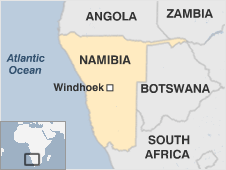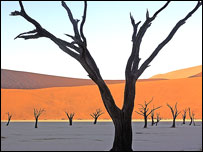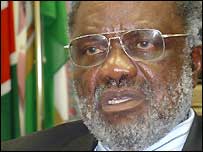
|
Germany took control of the area which it called South West Africa in the late 1800s. The discovery of diamonds in 1908 prompted an influx of Europeans. South Africa seized it during World War I and administered it under a League of Nations mandate.
Overview
Germany has apologised to Namibia for the colonial-era killings of thousands of members of the Herero ethnic group; their descendants have asked Berlin for financial compensation.
|
|
AT-A-GLANCE

Politics: President Pohamba took
over from independence fighter Sam Nujoma,
who led the ruling SWAPO party until 2007.
The opposition has only minor
representation in parliament
Economy: Main trading partner is
South Africa. Government keen to step up
land acquisitions from white farmers
|
Namibians achieved independence in 1990 after a bush war of almost 25 years. Inter-racial reconciliation encouraged the country's white people to remain and they still play a major role in farming and other economic sectors.
In recent years supporters of land reform have become more vocal. The expropriation of white-owned farms began in 2005 and the government says it aims to resettle many thousands of landless citizens.
Like its neighbours, Namibia's wellbeing is being threatened by the HIV/Aids epidemic, which is estimated to affect 25% of Namibians. Mr Nujoma made the fight against the disease a national priority.
In the late 1990s secessionist troubles in the Caprivi Strip, in eastern Namibia, prompted thousands to flee to Botswana. In 2002 the government declared that the area was safe for tourists.
Deserts occupy much of the country; their dunes take on shapes and colours according to the elements. The country also boasts game-rich grasslands and a semi-arid Central Plateau, large tracts of which are given over to livestock farming.
Facts
- Full name: The Republic of Namibia
- Population: 2.2 million (UN, 2009)
- Capital: Windhoek
- Area: 824,292 sq km (318,261 sq miles)
- Major languages: English (official), Afrikaans, German, Oshivambo, Herero, Nama
- Major religion: Christianity
- Life expectancy: 60 years (men), 62 years (women) (UN)
- Monetary unit: 1 Namibian dollar = 100 cents
- Main exports: Diamonds, copper, gold, zinc, lead, uranium, livestock
- GNI per capita: US $4,200 (World Bank, 2008)
- Internet domain: .na
- International dialling code: +264
Leaders
President: Hifikepunye Pohamba
Hifikepunye Pohamba, representing the ruling Swapo party, won a landslide victory in presidential elections in November 2004.

Hifikepunye
Pohamba, Sam Nujoma's chosen successor
|
Opposition parties disputed the outcome and demanded a recount. Most observers said there had been little evidence of irregularities during voting.
Mr Pohamba, the chosen successor of the former President Sam Nujoma, is a founder member of Swapo and a long-time confidante of Mr Nujoma.
Mr Pohamba, who was inaugurated in March 2005, said he would pursue his mentor's policies, including proposed land reforms. He has warned of a possible "revolution" should white farmers not agree to sell land to the government.
Born in 1935, Hifikepunye Pohamba went into exile in the 1960s and later studied in the Soviet Union.
The president, who shares executive power with the cabinet, is limited to two five-year terms.
- Presidential and parliamentary elections are due on 27 November 2009.
Media
Namibia is one of the more media-friendly countries in Africa. The constitution provides for press freedom and on the whole this is respected by the government.
Media rights body Reporters Without Borders says there is "no major obstacle to the circulation of news".
Broadcasters and the private press give coverage to the opposition, including views critical of the government.
There are around 20 private and community radio stations. BBC World, CNN and South African and international TV channels are available via cable and satellite. Radio France Internationale broadcasts on FM in the capital.
There were some 100,000 internet users by March 2008 (ITU figure) - around 5% of the population.
The press
- The Namibian - private, English and Oshiwambo-language daily
- Namibia Economist - daily
- Die Republikein - Afrikaans daily
- New Era - state-owned daily
- Windhoek Observer - private, weekly
- Allgemeine Zeitung - German-language daily published in Windhoek
Television
- Namibian Broadcasting Corporation (NBC) - national state broadcaster
- Desert TV - private station in Windhoek
Radio
- Namibian Broadcasting Corporation (NBC) - state-run
- Radio Kudu - private, music-based network
- Radio Wave - private, music network
- Radio Energy - private, music station
- Radio 99 - private, music-based network
- Katutura Community Radio (KCR) - Windhoek, rebroadcasts some BBC World Service programmes
- Channel 7 - private religious station in Windhoek
News agency
-
Namibia Press Agency (Nampa)
AFRICA | ASIA-PACIFIC | AMERICAS | EUROPE | MIDDLEEAST | SOUTHASIA
Mauritania Mauritius Morocco Mozambique Namibia Niger Nigeria Republic-of-congo Rwanda Sao-tome-and-principe Senegal Seychelles Sierra-leone Somalia South-africa Sudan Swaziland Tanzania The-gambia Togo Tunisia Uganda zambia Zimbabwe Australia Brunei Burma Cambodia China East-timor Fiji Indonesia Japan Kazakhstan Kiribati Kyrgyzstan Laos Malaysia Marshall-islands Micronesia Mongolia Nauru New-zealand North-korea Palau Papua-new-guinea Samoa Singapore Solomon-islands South-korea Taiwan Tajikistan Thailand The-philippines Tonga Turkmenistan Tuvalu Uzbekistan Vanuatu Vietnam Antigua-and-barbuda Argentina Bahamas Barbados Belize Bolivia Brazil Canada Chile Colombia Costa-rica Cuba Dominica Dominican-republic Ecuador El-salvador Grenada Guatemala GuyanaHaiti Honduras Jamaica Mexico Nicaragua Panama Paraguay Peru St-kitts-and-nevis St-lucia St-vincent-and-the-grenadines Suriname Trinidad-and-tobago United-states-of-america Uruguay Venezuela Albania Andorra Armenia Austria Azerbaijan Belarus Belgium Bosnia-hercegovina Bulgaria Croatia Cyprus Czech-republic Denmark Estonia Finland France Georgia Germany Greece Hungary Iceland Ireland Italy Latvia Liechtenstein Lithuania Luxembourg Macedonia Malta Moldova Monaco Montenegro Norway Poland Portugal Russia San-marino Serbia Slovakia Slovenia Spain Sweden Switzerland The-netherlands Turkey Ukraine United-kingdom Vatican Algeria Egypt Iran Iraq Israel-and-palestinian-territories Jordan Kuwait Lebanon Libya Mauritania Oman Saudi-arabia Sudan Syria Tunisia United-arab-emirates Yemen Afghanistan Bangladesh Bhutan India Nepal Pakistan Sri-Lanka The-Maldives

